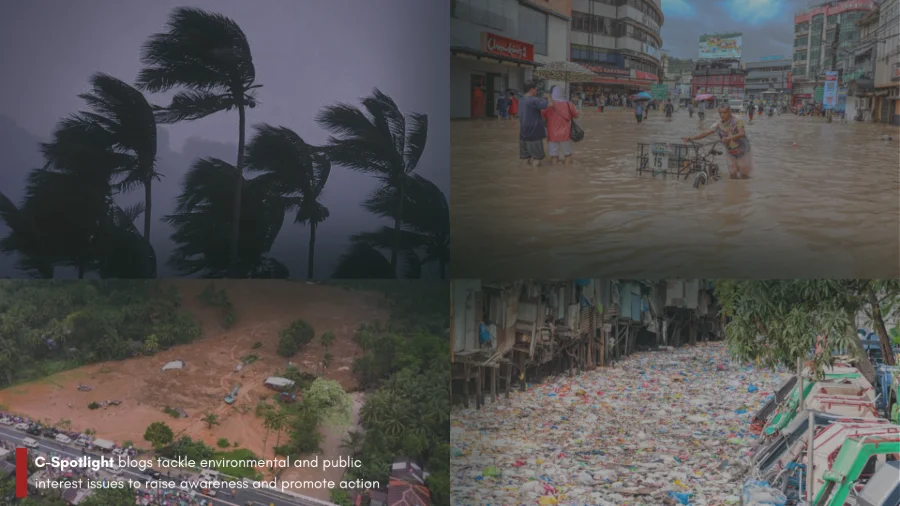Disasters, climate change and PTMP
By: C-Help Team

This month of July marks the start of inclement weather throughout the country, and coinciding with this is the observance of the National Disaster Preparedness Month.
Curious about how people view disasters, I asked my colleagues what comes to mind when they hear the word "disaster" and how prepared they are.
One of my colleagues immediately thought of suspension, saying that natural disasters, such as heavy rain, force communities, including Local Government Units (LGUs), to suspend classes and businesses. Some similarly answered that natural disasters cause immense disadvantage and distress to many people.
They are close to the official version.
Under Section 3(h) of R.A. 10121, a disaster is defined as "a serious disruption of the functioning of a community or a society involving widespread human, material, economic or environmental losses and impacts, which exceeds the ability of the affected community or society to cope using its own resources. Disasters are often described as a result of the combination of: the exposure to a hazard; the conditions of vulnerability that are present; and insufficient capacity or measures to reduce or cope with the potential negative consequences, Disaster impacts may include loss of life, injury, disease and other negative effects on human, physical, mental and social well-being, together with damage to property, destruction of assets, loss of services, social and economic disruption and environmental degradation."
Disaster, however, has acquired a different or leveled-up meaning in this era of climate change. And disaster preparedness is very relevant because natural disasters are exacerbated by climate change.
Climate change intensifies natural disasters by contributing to more frequent and severe occurrences of extreme weather events. Rising global temperatures result in prolonged droughts, heavier rainfall, and stronger hurricanes, disrupting ecosystems and endangering lives. Melting glaciers and polar ice caps cause sea levels to rise, increasing the risk of coastal flooding and displacement of communities. These amplified disasters not only threaten human safety but also destabilize economies, disproportionately affecting vulnerable populations. Addressing this issue necessitates urgent action to mitigate climate change and adapt to its growing impacts.
Based on the above, while observances similar to this play a crucial role in raising public awareness, it may also be a good time to raise the concern on aligning government programs with climate action because, as said above, disaster preparedness may not be enough.
An example of this concern is related to the Public Transport Modernization Program (PTMP) or the former Public Utility Vehicles Modernization Plan (PUVMP), which is deemed by the government to be a climate action. Drivers and operators are opposed to it because it is not aligned with the principle of a just transition in climate change and the goals and scope of disaster preparedness. Their views are well discussed in the case DLHB Transport Service Corporation, et al. v the Department of Transportation, et al.
In this case, the plaintiffs petitioned the Supreme Court to challenge the legality of certain provisions of the Omnibus Franchising Guidelines (DOTr Department Order No. 2017-11 or "OFG"), Implementing Guidelines of the OFG (Memorandum Circular No. 2018-013), among others, on grounds of violation of their constitutional rights to due process, equal protection, and right to association. Under the PTMP, drivers and operators are required to consolidate and maintain a terminal, ply at least 15 PUVs that use engines with Euro 4 or higher standards, phase out traditional jeepneys and meet additional requirements. Otherwise, they will not be prioritized for original applications or for renewal of provisional authorities or franchises. For small-scale operators/drivers, these requirements are unaffordable, and the consequence of non-compliance is oppressive, which is a violation of their rights. That's why they're saying that PTMP is not aligned with the principle of a fair and just transition in climate action, which requires respect for human rights.
Last month, Secretary Vince Dizon of the Department of Transportation told the Commission on Appointments when asked about the controversial public transportation plan: "Given the present state of the modernization, … I think the fact that those who purchased new vehicles but cannot pay their loans, that is a clear sign that it is not viable in its present state...We have to acknowledge that the program involves a lot of problems.” This is nice to hear because it is somehow a vindication of concerns of drivers/operators and their rights that were affected by PTMP. Underlying it is the need for just transition.
Indeed, a just transition in climate action is not merely an ethical imperative, it is a practical necessity for ensuring the success and sustainability of efforts to combat climate change. It represents a pathway to a future that is not only environmentally sustainable but also socially just, equitable, and inclusive where people are disaster-prepared and resilient.
So this month of inclement weather, let's not just be disaster-prepared. Let's fight climate change that worsens natural disasters, and one of the ways to do this is call for just transition in PTMP to ensure that it will succeed as a climate action.
